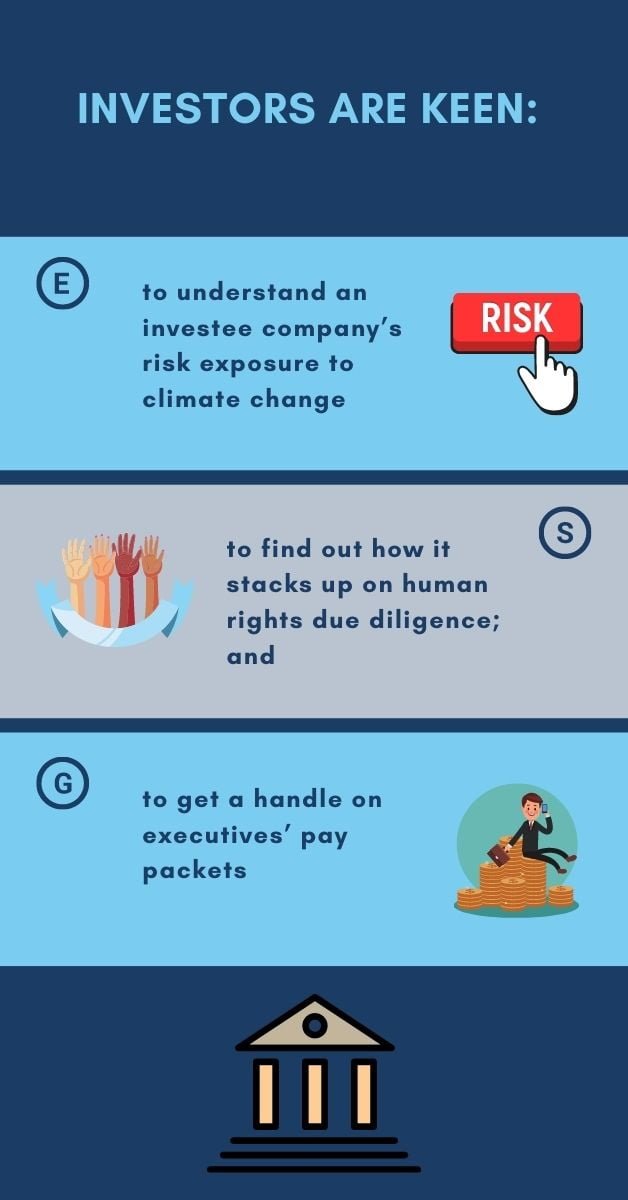The Power of Investors
by Kathy Ryan, Head of Responsible Investment, Irish life Investment Managers

As an investor, your money is out there in the world, supporting different companies. There will be those that manage environmental, social and governance (ESG) risks well, and others that don’t. But investing your money gives you the power to engage with companies on their ESG performance. After all, incorporating ESG considerations into your investment decisions isn’t just for the feel-good factor, it’s good financial sense.
Your Capital Counts
You might not know it, but if you’re in full-time employment, you’re likely to have at least some exposure to financial markets through a pension fund. As an asset manager, Irish Life Investment Managers (ILIM) manages such funds on behalf of our clients, putting their money to work by investing in a range of different companies. In terms of ESG standards, some will score better than others. Rather than completely avoiding those with lower scores, there is another option.
By taking an active ownership approach to managing our clients’ money, we can use our shareholder rights to push for positive change within these companies through shareholder resolutions or by voting against corporate resolutions we disagree with. It’s also an opportunity to engage directly with companies on their practices. When taken together, this means that investors have significant power to influence and drive corporate behaviour. In a nutshell, your money matters.
Having Your Say
One of the greatest powers for shareholders is their right to vote at company general meetings, having their say on how a company is run and what issues should be prioritised. Support for shareholder resolutions has markedly increased over recent years. Indeed, despite the Covid pandemic – or perhaps because of it! – 2020 saw investors intensify the use of this power, upping the pressure on companies seen as ESG laggards.
Shareholder resolutions can cover a range of topics, but the overwhelming majority relate to disclosure. Investors are keen to understand an investee company’s risk exposure to climate change (‘E’), find out how it stacks up on human rights due diligence (‘S’) and get a handle on executives’ pay packets (‘G’).
According to Morningstar – with similar findings from data provider Proxy Insight [1] – a record number of shareholder resolutions relating to environmental and social issues passed with majority support in 2020.[2]
The research identified a number of issues raised by investors, from climate risk and sustainability reporting to workplace diversity and political lobbying, with a number of corporate heavyweights, from Philipps to Chevron. This underlines our view that, when it comes to shaping corporate behaviour in a positive way, every vote counts.
Putting your money where your mouth is
Active ownership isn’t just about voting. Given the pool of clients’ money behind them, institutional investors like ILIM are well placed to constructively engage with companies, either individually or collaboratively with other investors. This means regular and ongoing contact on key issues to improve ESG performance.

ILIM’s engagement programme has been active for five years, with increasingly positive outcomes. This reflects two wider trends: 1) the greater disclosure and improved reporting on ESG issues by corporates globally; 2) a greater understanding of the impact of key ESG risks. The programme focusses on six core ESG themes, two from each of the environmental, social and governance pillars. While ILIM has chosen to also start engaging on anti-discrimination and diversity this year, climate change remains the main driver of our engagement activities, whether with companies directly or through collaborative engagements with other investors.
Collaborative engagements
ILIM is also currently increasing its involvement in collaborative engagements. In 2020, for example, ILIM was part of the CDP Non-Disclosure Campaign, which targets engagement with companies that failed to provide a response around their climate disclosures. The campaign saw 108 institutional investors (representing USD 12 trillion in assets) collaborate to engage with 584 companies on CDP Climate Change. This resulted in 156 companies – including names like Marathon Petroleum and Enbridge – providing the requested disclosures.
Why ESG Matters
When it comes to value, ESG isn’t just an ideological position confined to millennials. Factoring ESG considerations into investment decisions is relevant no matter who you are or what stage you’re at on your financial journey because, ultimately, ESG considerations are financial considerations.
Research from Morningstar on the performance of ESG funds in 2020 found that funds with greater ESG ratings outperformed their benchmarks by larger margins than funds with weaker ESG ratings.[3] This is also mirrored at the stock level: companies with higher ESG ratings outperformed in 2020. [4]
But the corollary is also true: companies that undergo severe ESG controversies significantly underperform those with low (or no) controversy.[5] The Deepwater Horizon oil disaster cost BP US$65 billion. But even before that event, prior accidents had already flagged ESG concerns at the oil major. In a similar vein, Volkswagen’s ESG score had flagged regulatory and labour management issues before the automaker faked emissions. The share price of both companies halved and took a number of years to recover.[6] But such outcomes are not inevitable. Monitoring ESG risks and engaging with companies on them can prevent ESG red flags before they impact shareholder value.
Material Concerns
ESG investing is no longer a fringe activity. Investors are realising that companies with higher ESG metrics are also better governed, of higher quality and experience less volatility.[7] Companies also realise that addressing ESG risks makes sense or long-term profit and risk minimisation. Climate change, board diversity, gender equality – all relevant issues of our time that companies should be addressing. As an investor, you have the power to engage with companies to make sure they do.
End
References
1 Proxy Insight, ‘2020 Global Shareholder Voting Review’
2 Jackie Cook, ‘Key ESG Issues Up for Shareholder Vote’ (4 June 2020)
3 Jeffrey Ptak, ‘Did ESG Pay Off for Fund Investors Last Year?’ (12 January 2021)
4 Imogen Tew, ‘How ESG-linked stocks outperformed in 2020’ (10 November 2020)
5 Carmine de Franco, ‘ESG Controversies and Their Impact on Performance’ The Journal of Investing ESG (Special Issue 2020)
6 Theo Andrew, ‘How fund managers respond when ESG controversy strikes’ (25 February 2020)
7 Tom Bailey, ‘The reason why ESG funds outperformed during the market sell-off’ (Interactive Investor, 24 March 2020)
Disclaimer
This document is intended as a general review of investment market conditions. It does not constitute investment advice and has not been prepared based on the financial needs or objectives of any particular person, and does not take account of the specific needs or circumstances of any person.
The author cannot make a personal recommendation for any person and you should seek personal investment advice as to the suitability of any investment decision or strategy to your own needs and circumstances. Any comments on specific stocks are intended as an objective, independent view in relation to that stock generally, and not in relation to its suitability to any specific person.
ILIM may manage investment funds which may have holdings in stocks commented on in this document. Past performance may not be a reliable guide to future performance. Investments may go down as well as up. Funds may be affected by changes in currency exchange rates.
Irish Life Investment Managers (ILIM) is an appointed investment manager to Irish Life Assurance plc
Irish Life Investment Managers Ltd is regulated by the Central Bank of Ireland
